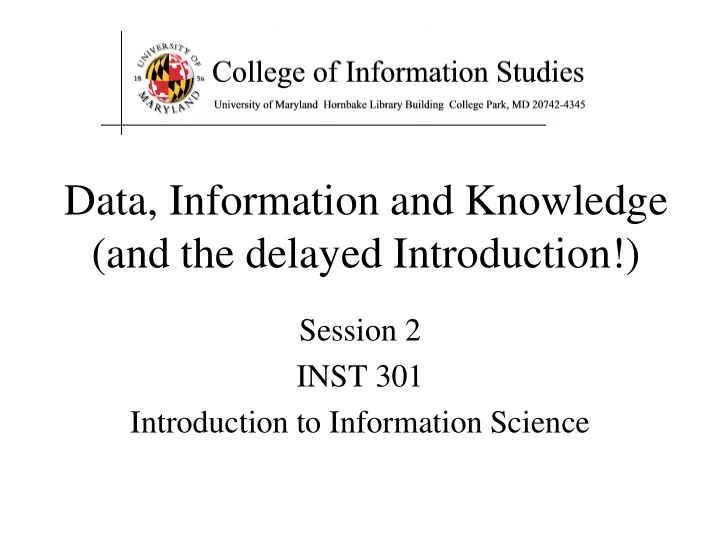

Data, Information and Knowledge (and the delayed Introduction!) Session 2 INST 301 Introduction to Information Science
Outline The Third Wave • Data / Information / Knowledge • All the usual stuff (syllabus, grading, …) • Information Science major
What is a Futurist?
Outline • The Third Wave Data / Information / Knowledge • All the usual stuff (syllabus, grading, …) • Information Science major
“Information” Wisdom Knowledge Information Data
Information Hierarchy • Data – Raw “facts” • Information – Contextualized facts • Knowledge – Actionable contextualized facts • Wisdom – Judgmental choices among possible actions
An Example • Data – 98.6 º F, 99.5 º F, 100.3 º F, 101 º F, … • Information – Hourly body temperature: 98.6 º F, 99.5 º F, 100.3 º F, 101 º F, … • Knowledge – If you have a temperature above 100 º F, you most likely have a fever • Wisdom – If you don’t feel well, go see a doctor
Washington Post (2007)
Outline • The Third Wave • Data / Information / Knowledge All the usual stuff (syllabus, grading, …) • Information Science major
Course Description • Introduction of information and knowledge management systems and their use by organizations . • Concepts underlying – database, – information retrieval, and – knowledge management systems will be discussed. • Focus on – the processes of becoming informed and – the products which result from those processes, as well as – the innovative approaches to information problem solving within an organization.
Information Data Knowledge (organization) (society) (individual) Lifecycle Information Enterprise Sys Internet Data as Asset Collaboration Web Data Modeling Institutions Search Engines Databases (2) Professions User Needs Databases Digital Gov Search Strategy CMS Security Social Networks Linked Data Privacy Data Mining Filter Bubble Ethics
Some “Subtexts” • The nature of innovation • The interplay of technology and society • The role of technical competence • Different ways of knowing and doing
Approach • Readings (done before class) – Acquire background – Can be consulted later as a source for details • Class sessions – Develop conceptual structure • Homework, Project – Gain hands-on experience • Quizzes, exams – Focus effort, measure progress
Structure • Classes start promptly at 2 PM – End promptly at 3:15 – Bring your devices and use them • But stay focused on the class discussion • Quiz at start of class on Tuesday – Exceptions: today; exam days • Homework due at start of class each Thursday – Exception: this week • Team project during Module 3 • Three “open book” exams
Grading • 60% for individual work – 11 quizzes @ 2% each for your best 10 – 3 exams @ 20% each for your best 2 • 20% for group work – Same grade for everyone in a project team • 20% your choice (individual or group) – 8 assignments @ 4% each (but capped at 20%) • No curve! – 90-100: some sort of A, 80-89: some sort of B, …
The Fine Print • Group work is encouraged on homework – But you must personally write what you turn in • Deadlines are firm and sharp – Allowances for individual circumstances are already included in the grading computation • Academic integrity is a serious matter – No group work during the exams or quiz!es – Scrupulously respect time limits
Contact Information • Doug Oard: – Office: AVW 3126 (or, by arrangement, HBK 2118F) – Office Hours: Wednesdays 10-10:55 AM – I’m also usually happy to stay after class – Email: oard@umd.edu (answered within 24 hours) • Indicate if you do not want my answer sent to the class • Jyothi Vinjumur – Office: AVW 3126 – Office Hours: Mondays 4-5 PM – Email: jyothikv@umd.edu (answered within 24 hours)
A Personal Approach to Learning • Work ahead, so that you are never behind • Find new questions everywhere – Then find the answers somewhere • Enrich your practical skills relentlessly • Pick topics you want to learn more about
Outline • The Third Wave • Data / Information / Knowledge • All the usual stuff (syllabus, grading, …) Information Science major
“Information Science” People Information Technology
B.S. in Information Science Data Web-Enabled Decision Science Data Science Data Mining Visualization Databases Support Concentration Information Web Statistical User Needs Integrative Organization Programming Analysis Analysis Capstone Core Introduction to User Data Internet Teams & Information Experience Infrastructure Organizations Modeling Science Design Elementary Pre-Calculus Programming for Introduction to Prerequisites non-CS Majors Psychology Statistics Mathematics Other Stuff
Before You Go • Please complete the ungraded survey
Recommend
More recommend